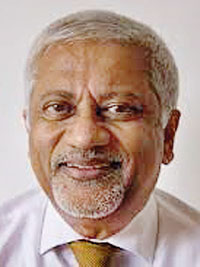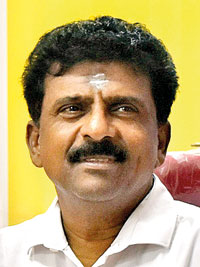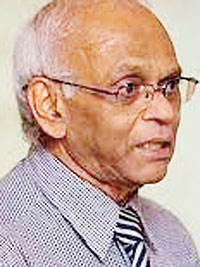News
Will IMF be the panacea for our economic woes
View(s):With the country’s economy in turmoil, calls for the Government to go to the International Monetary Fund (IMF) continue to grow. The Sunday Times reported last week that Finance Minister Basil Rajapaksa is to visit both the IMF and the World Bank in April when the two lending institutions hold their annual Spring sessions.
While many in the Government have also called for the country to approach the IMF, there is still opposition from within. Central Bank Governor Ajith Nivard Cabraal for example, has steadfastly opposed going to the IMF. Even some who ask that the Government consider the IMF option caution that it alone will not be able to fix the economic crisis that the country now finds itself in.
The Sunday Times spoke to a cross section of academics, economic analysts and members of the public to gauge their views on approaching the IMF and what else the Government needs to do recover from the current crisis.
 IMF can at least minimise pain
IMF can at least minimise pain
“We will not be able to get out of this crisis without any pain, but we can minimise the pain, especially for the most vulnerable, by a well thought out recovery programme that includes debt restructuring programme involving the IMF,” said Prof. Rohan Samarajiva, Founding Chair of LIRNEasia. He noted that the likelihood of achieving monetary stabilisation was higher if the IMF was involved. He also observed that it would be unwise to abandon the commitments to fiscal discipline on the first possible occasion, as was the case in the past. He held that sticking to the reforms was vital as this was the best way to avoid recurrences from happening. IMF is required to draw on the second tranche of assistance from India.
“That’s our considered opinion,” he noted adding that IMF alone will not suffice at this stage.
IMF could be a cushion pad to absorb economic shocks
Economist and Senior Lecturer at Department of Economics, University of Colombo M. Ganeshamoorthy pointed out that the sooner we signed up for the IMF deal, the better for the country since it is a bit late to seek such assistance as the country’s economy is going through an unprecedented crisis.
“Even though the country’s economy is heading towards collapse, the IMF assistance could be a cushion pad to absorb some of the worst economic shocks. CBSL printing money to meet financial caps is already heating up the economy,” he noted.
The unrealistic exchange rate currently imposed by the CBSL where official rate is maintained at Rs 202 while unofficially it is traded Rs 260 reflected in the sharp reduction of foreign remittance to the country which further aggravates the situation into worse, he stressed.
Seek IMF guidance to not go bankrupt
Sri Lanka’s economy is in a very precarious situation, said political scientist and academic Prof. Emeritus Jayadeva Uyangoda. “Limited availability of external financing for the government has resulted in a financial crisis. Now as a country we are in an extremely critical situation. Seeking assistance from the IMF is not the remedy for the financial crisis. However, as advice or as a form of guarantee we can seek their guidance to not go bankrupt.”
Sri Lanka’s economy has been facing mounting challenges with skyrocketing debt reaching unsustainable levels, he pointed out.
The IMF is likely to provide conditions aimed at instilling financial discipline and accountability. However, going to the IMF alone will not ensure a full economic and financial recovery, he cautioned.
Going to IMF will help us find a mid to long-term solution
Independent Economic Analyst Rohana Amarakoon said with COVID shutting off tourism, the labour force and exports have limited Sri Lanka’s foreign currency reserves and left it with few choices.
Every dollar is important because the nation’s overall FX reserves are lower than what is needed. Sri Lanka looks set to face a funding requirement as money is needed to plug the current account deficit. There are mandatory imports such as medicine, petroleum and essentials such as machinery and raw materials needed for exports that can’t be controlled.
In Sri Lanka what we do is a value added thing so most of the time imports are necessary.
At this level as a country can do very little and this raises the urgency for Sri Lanka to seek assistance from the IMF.
What we can do at this stage is refinance rather than restructure the notes. Privatising many government institutions which are loss making bodies and securing some source of foreign funding is even more urgently required now.
Instead of the IMF, the government went seeking economic packages from other countries but it’s not a sustainable solution.
Due to persistent external debt service burden, dollar reserves remain 720 million which is inadequate, despite the authorities’ ongoing efforts to secure through banning unessential goods.
Assistance will help to find a mid to long-term solution to the worsening external debt crisis in Sri Lanka.
 IMF deal will be short term treatment for chronic illness
IMF deal will be short term treatment for chronic illness
Jaffna Chamber of Commerce president R. Jeyasekaran pointed out that there has been no clear policy from the government on how it is planning to revive the economy with or without IMP assistance.
“An IMF deal could be a short term treatment for a chronic illness. The government should come up with an inclusive plan to develop the country’s economy with the input of all of its communities. Our diaspora communities can play a critical role in this but without a solution for ethnic conflict, nobody wants to come and invest in the country,” Mr Jeyasekaran said.
He further noted that it is time for the government to address the past wounds of the nation in order to face the current economic crisis as a united country with the resources in the country and abroad. “That’s how we can come out from this mess,”
IMF alone is not the sole solution to the country’s economic issues
Senior lecturer Department of Sociology of the University of Jaffna Dr. Ahilan Kadirgamar is of the view that going to the IMF alone is not the sole solution to the country’s economic issues, which urgently requires restructuring priorities and policy reforms in order to survive in the long run.
“IMF assistance will definitely help to improve our credit scores in order to go to the international capital market for further borrowings. As the US Federal reserve is to adjust its rates and considering the situation in Eastern Europe, such borrowings will be at higher interest rates which eventually put the country into a deep debt cycle,” Dr Kadirgamar said.
He argued that the government should prioritise the imports of essential items such as food, medicine, oil and other items required for export while considering public distribution of essential items to ease the burden on masses.
The strings attached IMF assistance will also have severe consequences on social safety nets programmes which are already in place. For example, a public-private partnership of Ceylon Electricity Board (CEB) which would restrict access to electricity in rural areas even though currently 90 percent of the country’s households are connected to power, Dr Kadirgamar warned.
It’s never too late. People are really suffering and the economy is in shambles. Proper economic management is the key. It is best to seek the advice of such experts if we are to recover. But the people need to be briefed properly on this. That’s what we expect from the President.
 Must go to IMF
Must go to IMF
Dr Ravindra Jayasekara – retired doctor from Ratnapura said it is good if we go to IMF. This is my second day waiting in line for fuel. The day before, I almost got to the pump when the fuel ran out. I came at 4 a.m. today but I’m still here in the afternoon. I stayed until 6.30 p.m. yesterday and left without fuel.
 Sri Lanka like a dead patient, too late to go to IMF
Sri Lanka like a dead patient, too late to go to IMF
I have told this Government that it should go to IMF when the Government was formed in 2019. There is no any other alternative for the Government, it has to go to IMF get an arrangement to move for the economic reforms, said Former Deputy Governor Central Bank Dr. W.A. Wijewardena.
However, now it is too late. If we want to get IMF assistance now it will take another three to six months to approve the loan. Which means the loan would materialise after September this year.
Even now Sri Lanka’s economy is dead; it is like dead patient. There no immediate alternative before us because we are actually bankrupt on every count and therefore question of moving to IMF assistance is invalid now.
Going to IMF only
creates vicious cycle
Since 1965 Sri Lanka has approached the IMF 16 times in its history, roughly about once in five years. We have approached the IMF on various issues such as tax structures, balance of payments, and so on. For the last 70 years Sri Lanka has been approaching the IMF and even post liberalisation since 1977, this has intensified said Dr. Kenneth de Zilwa – Economist – LankaClear Chairman.
If Sri Lanka continues to go into this high interest rate binge there will be no technology brought in, no investment put in place, and our global production and products will never be competitive, this is as a result of high commodity price inflation been passed through to our cost of production. As the cost of inflation rises you have to depreciate the currency.
This is a vicious cycle again that the IMF brings. When the currency depreciates inflation picks once up again. Not only that the cost of USD balance sheet debt too increases. As your revenue is in rupees and the balance sheet debt is in dollars. Our Balance sheet debt is approximately US$ 50 billion, so each 1.0 rupee deprecation is rupees 50 billion in additional funding that must be found to meet this expenditure, as the interest and capital has to be sourced from rupee financing. This tool of currency deprecation has been a typical IMF prescription used in all developing countries. Therefore, as a result the fiscal policy too remains relatively uncompetitive. How can we give incentives for domestic investment or investors, with this chronic fiscal condition?.
In 2015 when we went into a programme with the IMF, they advocated a similar scenario. The IMF said hands off the exchange rate and let it free float. When you have a balance sheet debt in dollars and you free float the currency you are asking for trouble. It will come back to bite you because you have to finance it via more external borrowings.So, if you depreciate the currency your entire input raw material cost structure, transport, energy, packaging costs rises across the board. Causing incremental inflation. Do you think we will remain competitive in the exports? it has not happened over the many years despite a 8pct average depreciation.
Begin engagement with
IMF without delay
Ceylon Chamber of Commerce Chairman Vish Govindasamy said, The Ceylon Chamber of Commerce notes with serious concern the adverse effects brought on its members and all sectors of the economy in general as a result of the ongoing interruptions to the supply of electricity coupled with frequent disruptions to the availability of fuel.
The Chamber is of the view that these issues are all ramifications of the shortage of foreign exchange experienced by the country and believes urgently addressing the currency issue is the fastest way in which the power and energy issues can be tackled in the short term. CCC will also soon provide further recommendations on what other actions are needed specifically on power and energy sectors in the medium to long term in consultation with relevant experts.
As a first step in this direction, the Ceylon Chamber of Commerce urges the Government of Sri Lanka to commence a process of engagement with the International Monetary Fund (IMF) without any further delay to obtain their technical advice in managing the debt servicing as well as boosting foreign reserves. The Chamber hopes that this engagement should result in a Debt Sustainability Analysis being carried out by the IMF which could pave the way for a pre-emptive debt restructuring programme.
It is the Chamber’s belief that a systematic and methodical approach to restructure debt with the support of the IMF will help the Government to successfully manage its external debt obligations while ensuring the availability of much needed foreign exchange to support vital economic activity.
Pursue support of IMF and formulate a reform programme
The on-going forex crisis has resulted in daily disruptions to the supply of fuel and electricity which are critical for the functioning of all sectors of the economy. There is also a significant shortage of raw material inputs needed for domestic and export production coupled with an inability to pay suppliers in a timely manner as highlighted in our Joint Chamber release dated December 22, 2021, said Shirley Jayawardena – President of Federation of Cambers of Commerce and Industry of Sri Lanka (FCCISL).
As a result, business activities are coming to a halt and the private sector is deeply concerned of the consequences this would have in terms of business continuity that could reverse some of the gains seen recently in tourism and export sectors. The consequences of the forex shortage are also impacting the public causing severe hardship on a daily basis while disrupting the livelihoods of Small and Medium Scale Enterprises (SMEs) and daily wage workers.
We would demand the Government to establish a market driven pricing formula for fuel, gas and electricity while also allowing flexibility on the exchange rate. We are of the view that it is better to manage a situation of cost escalations compared to the present shortage of essential items including foreign exchange which is crippling economic activity.
Immediately commence a preemptive foreign debt restructuring process in an orderly manner.
This should involve restructuring of both commercial and non-commercial debt. We feel commencing this process soon will provide a breathing space to allocate the scarce dollars towards essential imports such as fuel and medicines. Pursue support of IMF and formulate a reform programme that would provide confidence to the market and private sector with immediate effect.
The best way to say that you found the home of your dreams is by finding it on Hitad.lk. We have listings for apartments for sale or rent in Sri Lanka, no matter what locale you're looking for! Whether you live in Colombo, Galle, Kandy, Matara, Jaffna and more - we've got them all!

